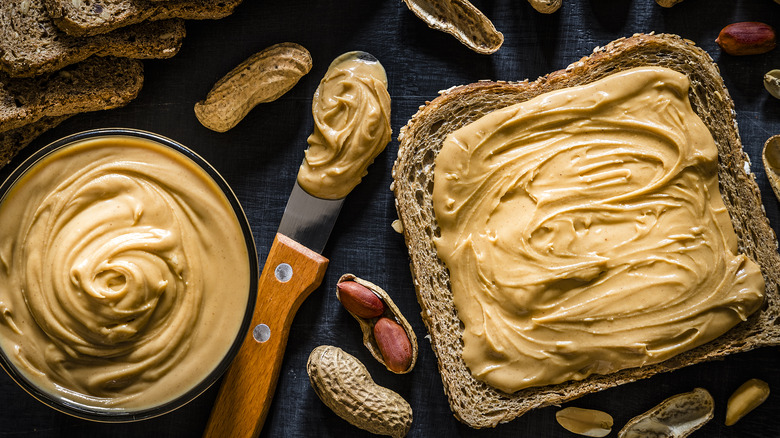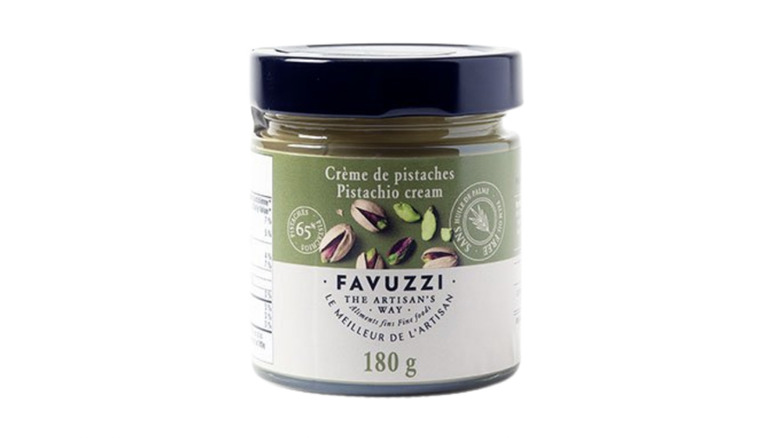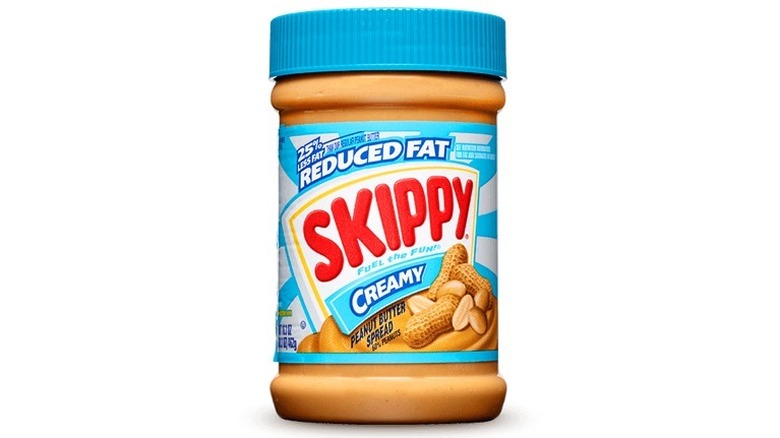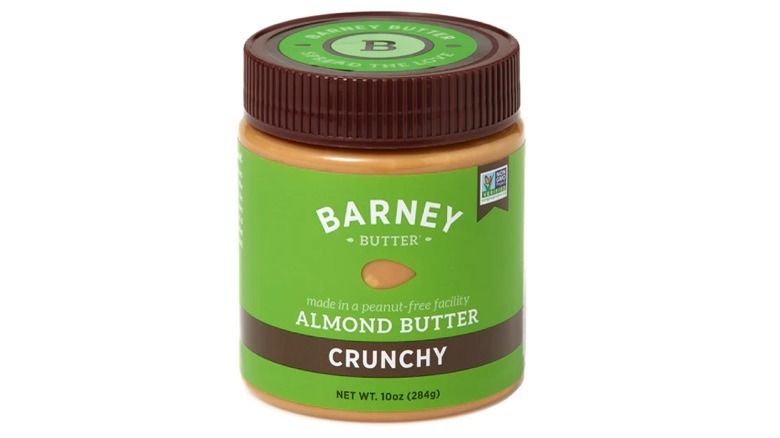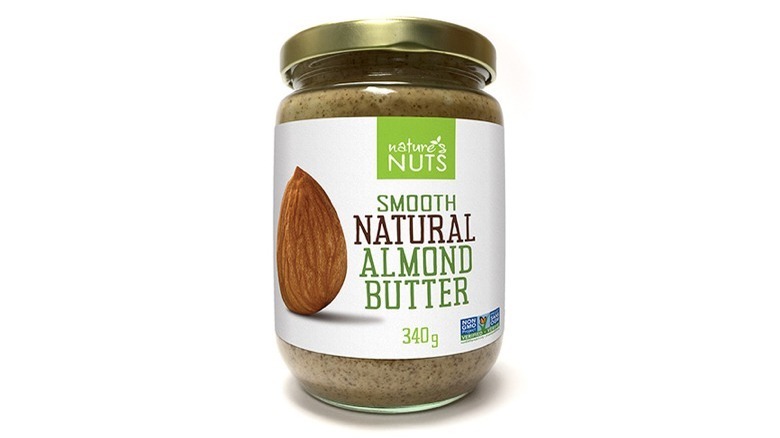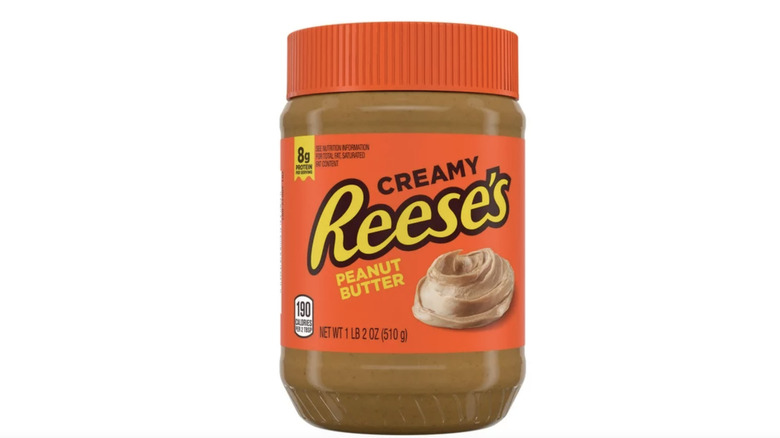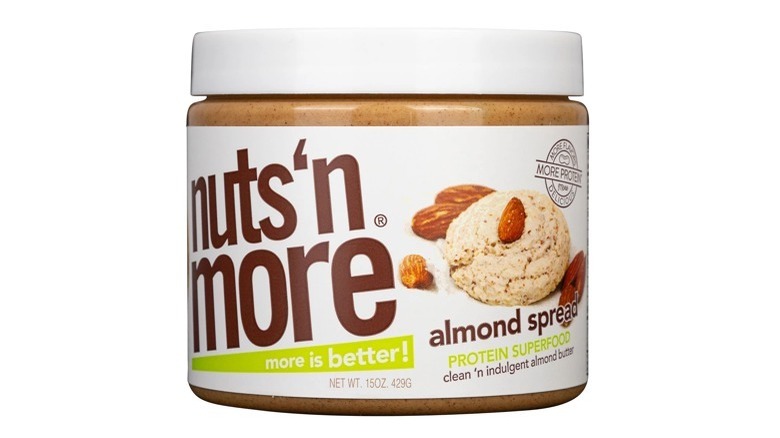6 Of The Unhealthiest Nut Butters You'll Find At The Grocery Store
There was a time when peanut butter was the undisputed king of all American nut butters, but it now seems that those days are gone for good. Need confirmation? Just head to your local grocery store and take a long stroll through the health aisle. You'll see almond butter, pistachio butter, hazelnut butter, and more. Some of these brands market themselves as healthy choices, but it's hard to know which of them is actually worth the hype. If you're anything like us, you're probably wondering which brands are truly healthy and which ones just look healthy.
Luckily, we have taken a deep dive into the nutrition facts of several different nut butters — including a number of different peanut butter brands. To evaluate the potential health benefits (and drawbacks!) of each, we cross-referenced the information on the back of the jar with the health information shared by the American Heart Association (AHA), the Harvard University Medical School, and registered dietitians. In the end, we found six nut butters that were definitively less healthy than the rest.
1. Favuzzi pistachio cream
In the TikTok era, pistachio desserts are all the rage, and Favuzzi's pistachio cream is a great ingredient to include in anything from pistachio tiramisu to pistachio cake. But, as delicious as this extra sweet nut butter can taste swirled onto the top of a mouthwatering dessert, it might not be the best thing to eat if you want to boost your health. The problem? It's chock full of sugar.
According to the label, Favuzzi's pistachio cream contains 7 grams of sugar per 15 grams of nut butter. In other words, almost half of the product is pure sugar. While this would not necessarily be a big deal if you were to consume, say, a teaspoon of the product, it could be very unhealthy to indulge in much more than that. As per the AHA, most men should not consume more than 36 grams of added sugar per day. Most women, meanwhile, should try to limit their intake to 25 grams.
Ultimately, this means that enjoying just a few spoonfuls of Favuzzi's pistachio cream could easily push you toward your daily limit for sugar. While that doesn't mean that you should avoid this product altogether, it does mean that you might want to limit your daily consumption.
2. Skippy reduced-fat peanut butter
If you're on the hunt for healthy foods, it's easy to reach for a low-fat nut butter — like Skippy's 25% reduced-fat peanut butter. Because of the label, it can seem like a healthier choice than the competition. After all, most low-fat foods are healthier than their full-fat alternatives, right? Not quite.
According to registered dietician Frances Largeman-Roth, the truth about low-fat peanut butter is actually much more complicated than that. As she told Today, the type of fats that you'll find in most nut butters are actually really good for you. Highlighting this, she explained, "The majority of the fat that peanuts (and peanut butter) contain is heart-healthy monounsaturated fat."
This means that Skippy's 25% reduced-fat peanut butter is lower in one of the essential nutrients that makes nut butters healthy in the first place. If you're looking for a healthier alternative, try buying a full-fat nut butter from Skippy's — or even another brand. This is the only way to ensure that you're getting the full health benefits of your nut butter.
3. Barney Butter crunchy almond butter
One of the best feelings in the world is cracking open a jar of nut butter and spreading a spoonful of gooey deliciousness onto a piece of toast. But, what makes certain nut butters so easy to spread? According to Healthline, the addition of palm oil tends to do the trick. This is especially apparent in Barney Butter's crunchy almond butter, with palm fruit oil listed among its ingredients. While this might make it easier for you to spread the product, however, it definitely is not the best for your health.
As explained by the AHA, palm fruit oil falls under the category of "tropical oils," which are notoriously high in saturated fats. Unlike the monounsaturated fats typically found in peanut butter, saturated fats are not considered healthy. In fact, the AHA warns that consuming more than 11 to 13 grams of saturated fats per day could result in an increased risk for heart disease.
Considering that just 2 tablespoons of Barney Butter's crunchy almond butter provide you with a whopping 1.5 grams of saturated fats, you might want to stay away from this particular almond butter and reach for a more natural brand instead. If you're on the hunt for a good alternative, New World Foods' crunchy almond butter is delicious, and it's known for containing just one ingredient: pure almonds.
4. Nature's Nuts almond butter
Just because a nut butter has only one ingredient, though, doesn't mean that it's necessarily healthy. One of the best examples of this is Nature's Nuts almond butter, which simply lacks the nutrients that you can find in competing brands. Whereas many nut butters contain high levels of potassium and vitamin E, Nature's Nuts almond butter does not offer a whole lot of nutritional value. This product only has a small amount of potassium — only about 2% of your daily value — and no vitamin E. Other nutrients in the product, like calcium and iron, are only present in similarly small quantities.
Unfortunately, this means that Nature's Nuts almond butter is at risk of offering you empty calories — calories that don't provide a whole lot of nutrition. The AHA recommends that people steer clear of empty calories and choose more nutrient-dense foods instead. According to its advice, this can help you get more of the vitamins and minerals that you need to survive. With this in mind, steer clear of Nature's Nuts, and select a nut butter with better nutritional benefits.
5. Reese's peanut butter
Salt and peanuts might sound like a match made in food heaven, but when it comes to maintaining a healthy diet, that's far from being the case. According to the AHA, consuming too much sodium can lead to adverse health effects down the road; as they explain, a diet high in sodium can cause high blood pressure as well as heart attacks and strokes.
With this in mind, it is best to steer clear of nut butters that have high sodium content — chief among them, Reese's peanut butter. Despite the brand's reputation for delivering a tasty product, it's also known for having more sodium than many of its competitors. Per the Hershey's website, just 2 tablespoons of Reese's peanut butter represents 6% of your daily sodium intake. While this might seem like a relatively small amount, other peanut butter brands, like Justin's, contain as little as 1%. Because of this, you might consider switching brands as a way to cut down on your daily sodium intake.
6. Nuts 'N More almond spread
At first glance, Nuts 'N More almond spread looks like some of the healthiest stuff on the market. The label describes the product as "clean 'n indulgent almond butter" and even invokes the term "superfood." Despite this marketing, however, Nuts 'M More nut butters aren't necessarily as healthy as they appear. The reason? They're full of artificial whey protein isolate.
According to Harvard Medical School, the long-term health impacts of whey protein powders are still unknown. However, many of the powders currently on the market have been found to contain dangerous components, including heavy metals like arsenic, lead, mercury, and cadmium. To complicate matters further, researchers have also found that some varieties of whey protein powder may contain carcinogens, which could lead to cancer in the long run.
Although it can be challenging to consume enough protein in any given day, Harvard University medical professionals suggest relying on whole foods, such as plain nuts, for your protein fix, rather than on artificial sources.
